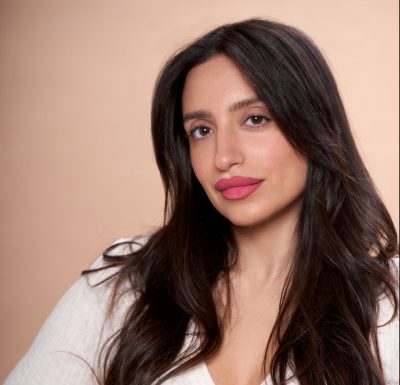
Q & A with Egyptian-born Canadian actor, Christine Solomon, who has rosacea.
*Christine is an Ambassador for the Acne and Rosacea Society of Canada’s Rosacea Awareness Campaign.
When were you diagnosed with rosacea and what were your thoughts at the time?
“As I grew older, into adolescence, I began to notice small breakouts on my cheeks. Of course, this was happening right at the time where hormones are kicking in, so I thought it was acne. I purchased acne products off the shelf, and that turned out to be a big mistake! My cheeks became inflamed because of the ingredients in those products, and my condition worsened. That’s when I consulted a dermatologist for the first time, and he diagnosed me with rosacea at the age of 14 years old.
“At that age, to hear that it was an incurable condition broke my heart. How could this be? What did I do or eat to get this? I felt it was my fault, for applying random products to my skin in an attempt to self-cure what I thought was acne, but as I started researching rosacea, I discovered that you can control it through diet and a proper hygiene routine.”
How do you cope with rosacea and any advice to others with this condition?
“I try to control it as much as possible through simple habits, like avoiding touching my face throughout the day to minimize the accumulation of bacteria and sleeping on a satin pillow case. I wash my face with a gentle cleanser twice a day and never sleep with makeup on.
“I have in fact learned to stay away from heavy makeup outside of work. I rarely wear foundation as it clogs pores. If I need to apply one for coverage, a water-based foundation seems to do the trick for me.
“Stress can be a major trigger, so I have started meditating, going to the gym and walking as a way to take time for myself and breathe.
“But primarily, I believe rosacea is triggered from inflammation inside the body, so its effects can usually be minimized by paying close attention to what you put in your body. I stay away from junk/fast food, or any kind of food that is inflammatory.
“I find that a balanced, organic diet has helped ease my rosacea, but I know that there are many natural or organic foods that can still trigger inflammation, so it’s been a trial-and-error process. I’m not a big fan of diets or fads, but limiting certain foods, like gluten, wheat, oats, meat and dairy, has worked for me.
“Our bodies talk to us all the time and I think you need to listen and eliminate what doesn’t work for you. Everyone has different triggers, even if some are more common than others. Although I tend to choose organic ingredients, I always remember that poison ivy is also natural, but I still wouldn’t apply it to my skin!
“And, of course, hydration is extremely important. I drink water and soothing herbal teas all the time, and particularly love lime water.
“I take this condition very seriously and do my best to minimize its effects, because if blood vessels become visible on the cheeks and nose, I know it can be permanent. Rosacea does not go away on its own and if left untreated, it may worsen over time. There may be permanent skin and eye damage in the long term. It is not something you just cover up with no regard to trying to heal it.”
…
See news story with comments from Christine, “Rethinking Rosacea in People of Colour”.
Other articles: